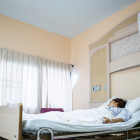Hospitals’ ‘Team Effort’ Reduces Number Penalized For High Infection Rates, Injuries
|
Six Connecticut hospitals will lose 1% of their Medicare reimbursements this fiscal year under a federal program that levies penalties for high rates of hospital-acquired injuries and infections. It’s the lowest number of hospitals penalized since the program began leveling funding cuts in 2015, data from the Centers for Medicare & Medicaid Services (CMS) show. The hospitals are among 774 nationwide that will lose funding under the Hospital-Acquired Conditions Reduction Program, according to a Kaiser Health News analysis. The program was created by the Affordable Care Act. When assessing hospitals, the government examines how many infections and other potentially avoidable complications patients suffered – things like blood clots, sepsis, bedsores and hip fractures.







